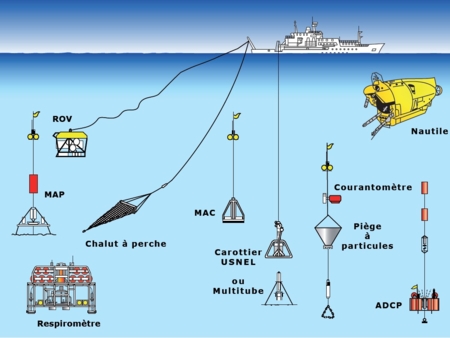Post-doctoral fellow on the role of microorganisms in the alteration of iron- and sulphur-rich minerals at deep sea hydrothermal ecosystems
Work context of Post doc fellow ref UMR6197
The Biology and Ecology of Deep Marine Ecosystems (BEEP) laboratory is a joint research unit (UMR 6197) of the CNRS, UBO and Ifremer located in Plouzané. This unit offers a multidisciplinary approach to the biology and ecology of deep marine ecosystems, taking into account both microbial and faunal compartments. It comprises around 50 permanent and 40 non-permanent staff working on 2 adjacent campuses (IUEM and Ifremer).
The person recruited, for a period of 18 months, will be assigned to the BEEP laboratory located at the Institut Universitaire Européen de la Mer (IUEM), under the co-direction of Dr. Sophie MIESZKIN and Dr. Karine ALAIN and Dr. Olivier ROUXEL of the Geo-Ocean UMR 6538 laboratory.
The post-doctoral project is part of the ANR LIFEDEEPER (LIving together in the Future: vulnErability of DEEP sea Ecosystems facing potential mineral Resources exploitation; ANR-22-POCE-0007) which aims to develop new approaches and integrated studies (in situ, in vivo, experimental, modelling and qualitative social science research), in order to understand the natural geological, geochemical and biological functioning of ecosystems at the level of the deep marine hydrothermal fields, TAG and Snake Pit, located on the Mid-Atlantic Ridge (MAR), and on a larger scale in the Atlantic Ocean.
Post-doctoral project
Deep-sea marine hydrothermal ecosystems are highly dependent on iron and sulphur rich substrates present in significant concentrations in sulphide minerals. The diversity and structure of the microbial communities involved in the iron and sulfur cycle in this ecosystem could therefore strongly influence the alteration (dissolution, precipitation and biomineralisation) of mineral structures. These processes are important to consider in order to understand the evolution of seafloor deposits and also to understand and better anticipate the impact of future mining operations on the mining licence area, which includes the TAG and Snake Pit hydrothermal fields.
The aim of this post-doctorate is to highlight the mechanisms of alteration at the scale of hydrothermal chimneys and to identify the key microbial and abiotic processes based on a mesosome approach using gas-lift bioreactors to enrich microbial communities while controlling temperature, pH and gas conditions.
During the BICOSE3 oceanographic campaign (20 October - 6 December 2023), samples of the hydrothermal vent and hydrothermal fluid will be taken and placed in two gas-lift bioreactors. One bioreactor will simulate reduced anaerobic conditions at high temperature (80°C) and the second will simulate more oxidized microaerophilic conditions at 20°C. A 35- day enrichment period will then be carried out on board, for the duration of the oceanographic campaign. Samples will be taken daily for mineralogical, microbiological and microscopic analyses.
Activities
The aim will be to attempt to elucidate the alteration mechanisms (microbial and abiotic) at the scale of hydrothermal chimneys as a function of the redox state (reduced anaerobic condition versus microaerophilic oxidized condition) of the mesocosms via a multidisciplinary geomicrobiology approach (mineralogical analyses, cell counts) coupled with microscopy to observe microorganisms/minerals interactions (Scanning Electron Microscopy (SEM), Confocal Microscopy and Fluorescence In Situ Hybridization (FISH)). At the same time, the structure of microbial communities, with regard to physico-chemical factors, will be highlighted by molecular biology analyses (environmental DNA extractions, PCR and sequencing) and bioinformatics (metabarcoding and metagenomics).
The samples will be available for the various analyses from the start of the post-doctoral contract.
Skills
The candidate should have expertise in microbiology and, if possible, expertise in deep-sea microbiology.
One or more skills in :
- Geomicrobiology (mineralogy, biomineralization) and biogeochemistry,
- Molecular biology and bioinformatics: from eDNA extraction to NGS data analysis (metabarcoding and metagenomics), with the ability to use R studio.
- Microscopy (SEM, Confocal and/or FISH)
- Fluency in written and spoken English.
The candidate must be rigorous and methodical, autonomous, organized, able to work in a team and have good interpersonal skills.
Application
Please send your CV/personal resume and covering letter to the 3 people in charge:
- Sophie Mieszkin : Sophie.Mieszkin@univ-brest.fr
- Karine Alain : Karine.Alain@univ-brest.fr
- Olivier Rouxel : Olivier.Rouxel@Ifremer.fr
For further information, please contact Sophie Mieszkin on +33 (0)2 98 49 87 31.







